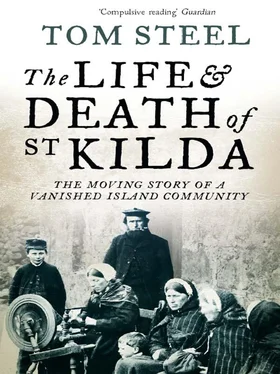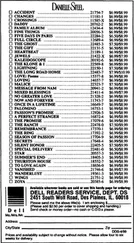After the defeat of his army at Culloden, Charles Stuart and a number of prominent rebels were thought to have escaped to St Kilda. On 10 June 1746, General Campbell of Mamore’s intelligence services reported the rumour to him, and a grand expedition was swiftly mounted to go to St Kilda.
In the afternoon of 19 June soldiers and levies were ferried ashore at Hirta. The islanders had noticed the ships approaching several hours before and had taken to hiding-places in the hills. Forever in dread of being robbed and attacked by pirates, they had centuries before carved out small caves in the scree slope to the west of the village. Totally invisible to the naked eye from village level, the caves provided perfect cover. After searching the village the soldiers finally came across a group of men. The St Kildans had no idea what the soldiers were talking about. The islanders did not know of the existence of a Young Pretender, let alone of King George himself.
The people were to remain totally ignorant of the defeats and victories of a country fighting for an empire until the First World War broke out. In 1799 they had not heard of General Howe’s illustrious crushing of the army of George Washington, and in 1815 knew nothing of Napoleon’s Hundred Days that ended at Waterloo. When George Atkinson of Newcastle-upon-Tyne visited the island in 1831, the first question he was asked was ‘Is there any war?’ It was traditionally the first question asked of any stranger, not that the St Kildans had any idea of what fighting was like. They took part in no war and never lost any of their number in battle. In a description of the islands for the period 1577 to 1595 in which each parish of MacLeod of MacLeod’s empire was allocated the number of men it was expected to put into the field of battle, St Kilda was said not to supply any men because it was inhabited by poor folk who lived too far away. The same attitude of mind found expression in more modern times. St Kilda remains one of the few communities in the British Isles that has no war memorial. ‘Safe in its own whirlwinds and cradled in its own tempests, it heeds not the storms which shake the foundations of Europe,’ wrote Dr MacCulloch in 1819, ‘and acknowledging the dominion of MacLeod and King George, is satisfied without enquiring whether George is the First or the Fourth of his name.’
In 1836 when the island was cut off from the mainland for nearly two years, the minister found, when a passing ship dropped anchor in the bay, that he and his congregation had been praying for King William months after his death. The minister changed his prayers to ‘His Majesty’. It was not until the spring of 1838, by which time Queen Victoria had been on the throne for nearly a year, that to his embarrassment he finally got wind of the sex of his new monarch.
Few on the mainland were prepared to take on any responsibility towards the people of so isolated an outpost. When James IV of Scotland passed an Act stating that islands were in future to be under his rule, he excluded St Kilda because it was so remote that he could not guarantee the people living there his protection. In more modern times, the existence of a community on the island was completely unknown to the Poor Law Commissioners. It was not until 1851 that the first official census was taken on St Kilda – fifty years after the first had been carried out on the mainland. The St Kildans never paid income tax because the Inland Revenue did not bother to send them forms to fill in, and they never paid rates. They never cast a vote in either a local or a general election. No aspiring politician ever sought to solicit their support, although a few Members of Parliament used St Kilda as an example when they wished to complain about the treatment of impoverished areas of Scotland by the government. The islanders never needed to call a policeman. No crime has been recorded in four hundred years of their history. ‘If this island’, wrote MacCulloch, ‘is not the Eutopia so long sought, where will it be found? Where is the land which has neither arms, money, law, physic, politics, nor taxes? That land is St Kilda…Neither Times nor Courier disturbs its judgments…No tax-gatherer’s bill threatens on a church-door, the game laws reach not gannets…Well may the pampered native of the happy Hirta refuse to change his situation.’
A few departments of state showed an occasional interest in the people of St Kilda. The Registrar of Births, Deaths, and Marriages periodically checked the books, and the Receiver of Wrecks at Stornoway on the isle of Lewis claimed half the flotsam and jetsam that drifted ashore on St Kilda, if ever the islanders saw fit to tell him about it. Reports on the physical and economic situation of the islanders were made to the Scottish Home and Health Department in Edinburgh, particularly in the latter years, and a police constable from Harris was sent to make notes.
Nor were the people deprived of official proclamations. On 2 April 1901, the Westminster Gazette announced: ‘His Majesty’s ship Bellona left Greenock yesterday for St Kilda. The captain will land with a party of marines and bluejackets and announce the death of Queen Victoria and read the proclamation of King Edward’s accession. Under the British Standard, the party will present arms, and the band will play “God Save the King”.’ The British monarchs have visited practically every corner of the globe, but it was not until August 1971 that Queen Elizabeth II became the first to set foot on what is the most westerly point of her kingdom.
Isolation makes for limited knowledge. In 1697, the St Kildans were intrigued by the samples of writing shown to them by Martin Martin and were amazed that people could express themselves and communicate with others in such a way.
When a St Kildan was taken to Glasgow in the early part of the eighteenth century, he was worried by the patches worn by the ladies of fashion because he thought they were blisters. He was astounded and frightened that there could be so many people in the world as were to be found in the city, and when some big loaves of bread were placed before him he could not make up his mind whether they were stones, pieces of wood, or made of the flour and water the local inhabitants told him they were. Another islander was shown St Mungo’s Cathedral in Glasgow at about the same time. He remarked that the pillars and arches of the church were the most beautiful caves he had ever seen. He was taken aback by the size of Glasgow and was surprised that people could move about from place to place in carriages pulled by horses.
Even knowledge of things natural, like animals and plants, was limited on Hirta. The islanders were never to know what a pig, a bee, a rabbit, or a rat looked like. They never saw an apple until 1875 when John Sands took three with him to the island. They had no idea what a tree looked like, for no trees grow on St Kilda. It was not until a few of them began to venture forth to the mainland before the evacuation – some for a holiday, others in search of work – that they first saw and then came to know the hundreds of objects that are part of everyday life on the mainland. For centuries the St Kildans measured time by the motion of the sun from one hill or rock to another and by the ebb and flow of tides. Even in 1909, the Old Style Calendar still operated on Hirta. Unlike Scots anywhere else in the world, the St Kildans celebrated New Year on 12 January.
The fear of the incomprehensible and unknown made for a deep attachment to their island home. Even as late as 1875, John Sands discovered, ‘All beyond their little rock home is darkness, doubt and dread – incomprehensible to us.’ The physical size of their world and the small number of persons involved in it made for the existence of strong relationships within the community. St Kildan was inextricably bound to St Kildan. All of them were tied emotionally as well as physically to their desolate rock in the Atlantic. Even if it had been possible, few islanders ever wished to leave St Kilda. Ewen Gillies was one of the few who ventured forth into the big world that lay beyond Hirta.
Читать дальше












